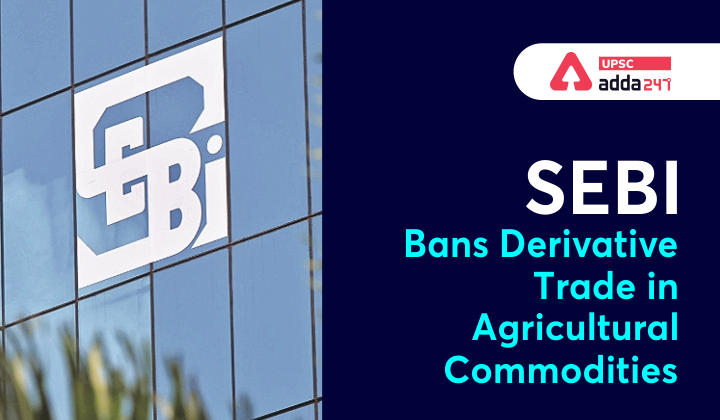Table of Contents
SEBI Bans Derivative Trade in Agricultural Commodities: Relevance
- GS 3: Indian Economy and issues relating to planning, mobilization, of resources, growth, development and employment.
SEBI Bans Derivative Trade in Agricultural Commodities: Context
- Recently, Securities and Exchange Board of India (SEBI) banned the derivative trade of seven agriculture commodities on the future’s platform of National Commodities and Derivatives Exchange (NCDEX) for one year with immediate effect.
SEBI Bans Derivative Trade in Agricultural Commodities: Key points
- Banned commodities: chana, wheat, paddy (non-basmati), soyabean and its derivatives, mustard seed and its derivatives, crude palm oil and moong.
- SEBI had earlier banned chana and mustard seed derivative trade on August 16 and October 8 respectively.
SEBI Bans Derivative Trade in Agricultural Commodities: Why this decision?
- Speculators:
- It is believed that speculators are playing a critical role in shooting up the prices, which needed to be discouraged to curb inflation and support growth in the post-pandemic situation.
- Inflation:
- Rise in prices of essential commodities is fuelling inflation.
- According to the recently released monetary policy statement by RBI, CPI inflation went up in October to 4.5% from 4.3% in September. Moreover, RBI has projected CPI inflation at 5.3% for FY22.
- The persistence of high core inflation since June 2020 has been an area of policy concern as input cost pressures could rapidly be transmitted to retail inflation as demand strengthens.
- Also, it is expected that headline inflation will peak in Q4 of 2021-22 and soften thereafter.
SEBI Bans Derivative Trade in Agricultural Commodities: Impact of this decision
- India is the world’s biggest importer of vegetable oil and oil importers and traders use Indian exchanges to hedge their risk
- This measure will make it difficult for edible oil importers and traders to transact business.
- By banning future’s trade, the government is trying to insulate any price shock the market might feel in the days to come in case the production is not up to par.
SEBI Bans Derivative Trade in Agricultural Commodities: Issues
- While chana (Bengal Gram) has already been removed from three months ago, inclusion of rabi crops like wheat, mustard and moong has raised various questions.
- Some traders believe that this decision shows nervousness in the policy circles about rabi output due to fertilizer shortage that many parts faced in the country.
- Most traders felt this move was regressive and took the fledgling trade in commodities markets years back.
About NCDEX
- NCDEX is a trading platform, where buyers and sellers could put commodities on sales which were to be closed at a “Future’s” date.
- In case either the buyer or seller refused to honour these contracts, they could exit the same by paying a small fee.
- Future’s contracts give an accurate information about price trends for the commodities trade and acted as a guide for hedging.
What are derivatives?
- A derivative is a contract between two parties, where the contract derives its value/price from an underlying asset.
- The most common types of derivatives are forwards, futures, options, and swaps.
- Underlying assets could include commodities, stocks, bonds, interest rates, and currencies.
- People enter into derivative contracts to earn a large number of profits by contemplating the underlying asset’s value in the future.
What is derivative trading?
- In derivatives trading, traders trade in contracts as compared to trading in physical assets.
- This type of trading takes place when traders speculate on the future price of an asset through buying or selling of derivative contracts to maximise profit.
- Traders also use derivatives for hedging to minimise risk against an existing position.
Also Read:





 TSPSC Group 1 Question Paper 2024, Downl...
TSPSC Group 1 Question Paper 2024, Downl...
 TSPSC Group 1 Answer key 2024 Out, Downl...
TSPSC Group 1 Answer key 2024 Out, Downl...
 UPSC Prelims 2024 Question Paper, Downlo...
UPSC Prelims 2024 Question Paper, Downlo...




